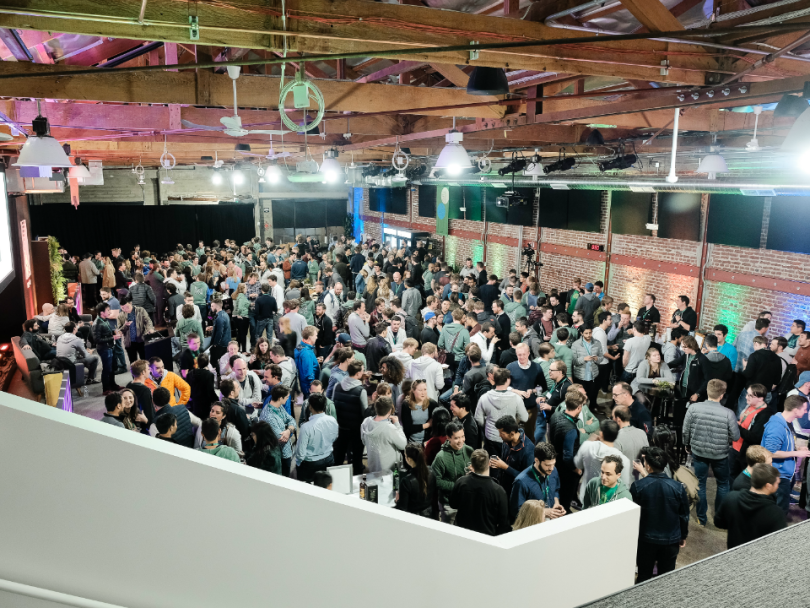
Any company is bound to look different at its IPO than it did at its seed round. In the tech industry, change is the name of the game. Yet, remaining true to a core ethos can also act as an anchor when navigating the industry’s sometimes-stormy seas.
Built In NYC heard from four local tech companies about how they have evolved since the early days — and, in some cases, why they chose to stay the same.

Today, Palantir is known as one of the largest and most innovative firms in the industry-critical data space. Yet, as Head of Recruiting and Communications Bonnie McLindon shares, it wasn’t too long ago that Palantir’s staff could be counted on one hand. They took us on the company’s journey from lean business to tech powerhouse — and shared why they’ll never lose their startup mentality.
What was your company like when it first launched?
Palantir was launched in 2004 by three software engineers and a philosopher. Our original mission was to build software that would help intelligence agencies make better use of data. Our early days were intense. The mission was serious and the work was difficult. The naysayers were loud. Venture capitalists didn't understand why we hired engineers instead of salespeople, or why we were building enterprise software when the rest of the Valley was high on consumer internet. Government officials didn't think a few engineers from California could offer more than the Beltway contractors they knew so well.
But our early employees quickly developed a deep camaraderie that propelled them through the late nights and long meetings. They shared a lot of inside jokes, pranks, and caffeinated beverages — and, more importantly, they shared a belief that technology was the best lever we have against our hardest problems. They were confident in the value of their work, even when everyone around them questioned it.
How has the industry's evolution caused your company to change?
We've grown a lot since 2004, from no customers to hundreds, and four employees to over 2,000. We've refused to abandon the startup ethos and scrappy mentality that drove our early success. We have continued to invest in our Palantir community, and we're grateful to have maintained it even as we've grown. Our founding principles haven't changed. We're still strongly committed to the principle of human-computer symbiosis, and to ethical engineering.
We now build two software products, Palantir Gotham and Palantir Foundry. But the value proposition is fundamentally the same for both: As organizations deal with more and more data, it becomes harder to actually use it. The data challenges we sought to solve in national security have proven to be true for heavy manufacturing, food safety, pharma R&D, finance, you name it, and we’ve evolved our software to help these industries evolve as well. This means doubling down on features that drive radical, but responsible, collaboration: granular data security, version control, and tools for users with every level of technical skill to engage with data. People in organizations around the world now use Palantir to cut through complexity and unite around a shared data picture in order to make their most important decisions.
What are your hopes or plans for future improvement?
We're excited to keep growing! Our market is vast, and as data grows in volume and importance – so does our set of potential customers. We partner with many visionary organizations that want to wield their data to transform how they operate, and with our software, we are ready to help them do that. For us, the challenge is scaling our software and our organization without losing sight of the principles and culture that got us here.
As we grow, we're taking on problems that are increasingly critical to our customers' operations, and we are powering their most important decisions. From an engineering perspective, we're excited to see what advances in technology we can bring into our platform to deliver on that tall order, and on a related note, we're also excited to keep up our practice of contributing to the open source community. From an organizational perspective, we have to stay true to ourselves. We're unique. We don't fit neatly into any one category — we're not just a company building a data platform, and we're definitely not a consultancy. It's a tricky balance, and maintaining it requires rigor and honesty with ourselves about who we are, and who we aren’t.
At the end of the day, what we care about most continuing to make a tangible impact on the world. Our customers are important institutions that keep our world safe and stable. Our technology helps these organizations evolve as the world around them changes, and we believe it’s critically important that they succeed. As long as we're making technology that empowers them to continue their missions, we’re on the right path.

Since it was founded in 2007, OnDeck has established itself as the largest small business lender in the United States. Chief Revenue Officer Andrea Gellert explains how this transition didn’t happen overnight — but through a dedicated team, committed to the success of small businesses across the country.
What was your company like when it first launched?
When I started six years ago, we only had about 70 people and were a venture-backed company with a typical startup mentality and culture. We all wore a variety of operational and functional hats, and we were scrappy and passionate about our mission to create innovative lending experiences and financial products that help small businesses succeed. Much has changed since we’ve gone public and grown to a company that, as of 2018, is nearly 600 people in three countries. Yet, our mission has remained at the core of what we do and informs our culture each and every day.
How has the industry's evolution caused your company to change?
As with all new industries, ours is moving through the various life cycles. When I started, we were in the startup cycle, moved through the growth cycle, and are now in the shake-out period. It’s been great to experience this evolution with OnDeck, as we were the original pioneer and are now the largest provider of online small business loans. We’ve worked hard to develop a product and business model that can both scale and create more structured operating models for our employees — which is essential now that there’s more competition and more established players in our space. In that regard, I like to think of ourselves as a perpetual underdog and not take what we have for granted. We have to remain nimble as a business, desirable as an employer and passionate as an advocate for small businesses.
What are your hopes or plans for future improvement?
One of the great things about being an NYC-based company is that we definitely feed off the city’s vibrancy and diversity, and will continue to look here for inspiration when it comes to the future of work and the dynamism of small business. While our mission remains the same, we clearly will continue to evolve our products and our culture to meet the needs of our customers and our business. For example, we’ve announced that we are expanding our product set this year to include equipment financing, which is a core capital need for small businesses that is highly fragmented and inefficient. And we will continue to support our passionate employees as well as hire those who share our desire to help small businesses succeed.

Amperity works with the marketing and CRM teams of companies like Tiffany & Co. and Teleflora to ensure they are reaching customers with the content they care about. CTO Jon Pospischil shared how the company, founded in 2011, has evolved into a sharper, better version of itself.
What was your company like when it first launched?
In some ways the company is very similar today as it was when it first started, and in others it's hard to believe we're the same company. Our core value proposition has remained consistent in its goal to help our clients build better relationships with their customers. Now, in our current state, we have the same values and philosophy but a more clear and defined vision.
How has the industry’s evolution caused your company to change?
In our early days, the industry was decidedly smaller. The evolution for us has been a vast, vast expansion of the competitive landscape. While this has its obvious challenges, it has in many ways been a blessing. We are more focused in our strongest areas and have created our own path in how we are able to differentiate and add value.
What are your hopes or plans for future improvement?
We plan on expanding our client portfolio and continue making strides in becoming industry thought leaders. As a people-first organization, now is the time where we can elevate our focus on culture and make Amperity an even better place to work.
When it was founded in 2009, Smartling set out to create a more connected world through its agile translation services. VP of Product Andrew Saxe walked Built In NYC through just how much the tech world has changed in the years since, and how Smartling has remained on the cutting edge.
What was your company like when it first launched?
Smartling’s early days were focused primarily on recruiting and scaling the business. There were a lots of challenges, from staffing to setting up an attractive and highly functional office space. Our first office was on Park Avenue, and when we outgrew it, we moved into our current HQ on Broadway. Each team member wore many hats — not only was everyone contributing to their primary job function, but people were also covering for roles that were yet to be filled. We hired at least one person a month, with a big focus on building the engineering and sales teams. Everything was very fast paced, but it has been rewarding to see a company rise from concept to a multi-million dollar business whose customers are globally recognized.
How has the industry’s evolution caused your company to change?
Smartling exists because technology has driven a massive change in consumer behavior and product experiences. We were founded in 2009, but think about how much the world changed since the iPhone came out in 2007. The right technology and professional services have enabled our customers to quickly adapt to these market demands and to enable scalability from one language into any.
We’ve adapted in two key ways: first, companies are creating more content, and they’re managing it on different platforms. Smartling centralizes language translation across devices and platforms. Second, mobile-enabled, content-rich experiences and companies naturally want to reach as many people as possible. The only way to do that is to speak the consumer’s language. Our professional language translation solution has become even more important to our customers; how we deliver this service has enabled customers to realize 40 percent cost savings.
What are your hopes or plans for future improvement?
Companies today are thinking about how to reach every person on Earth. We are going to play an integral role in this process with our technology and language services solution. The only way we can achieve this goal is by recruiting and retaining the absolute best talent. We just had our best year yet: our language services bookings increased 112 percent year-over-year! This is a direct reflection of the entire team at Smartling. To enable our growth, Smartling will continue investing in our people with professional development, and we’ll look to hire people across product management, customer success, sales and other business functions.






